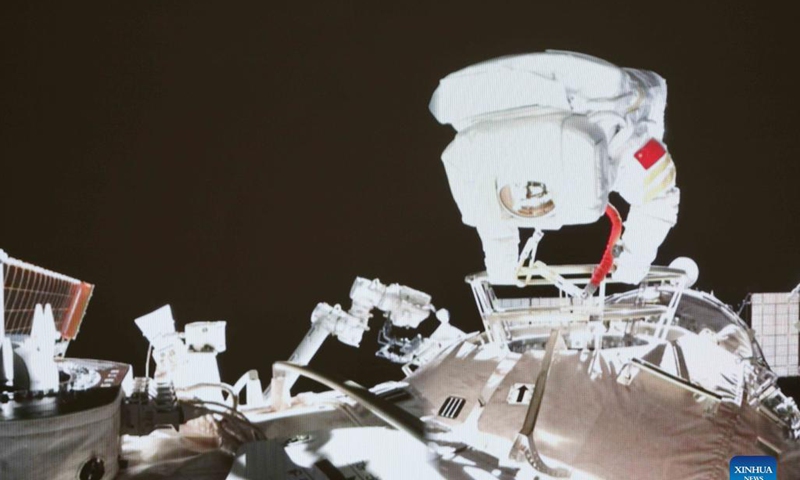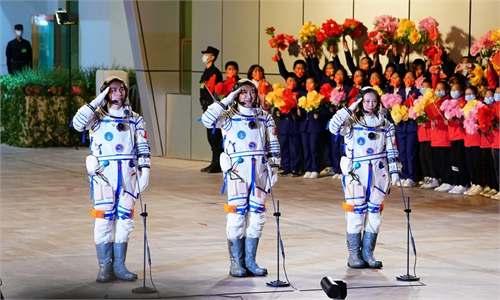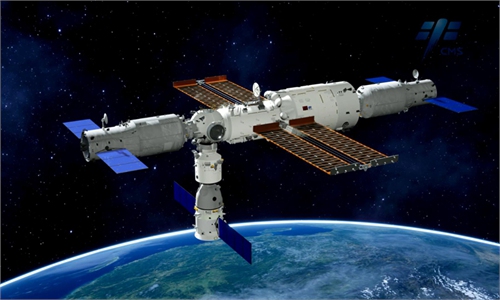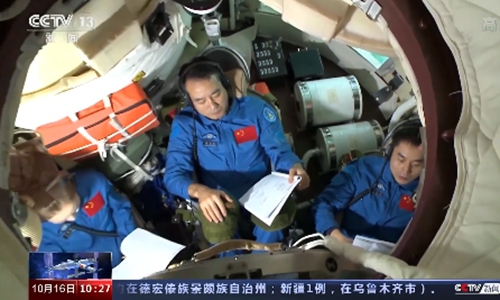
Screen image taken at Beijing Aerospace Control Center on Nov. 7, 2021 shows Chinese taikonaut Wang Yaping conducting extravehicular activities (EVAs) out of the space station core module Tianhe. Photo: Xinhua
China has completed basic function tests, achieved key experimental technology breakthroughs, and attained high-quality in-orbit test results and application data of the two large scientific research facilities - namely, the container-free material science laboratory cabinet and the high-microgravity science laboratory cabinet - onboard the country's orbital Tianhe core module, mission insiders said on Wednesday.
Major domestic aerospace contractor China Aerospace Science and Technology Corp (CASC) provided the information to the Global Times in a statement ahead of the two sessions, China's biggest annual political event, set to kick to start on Friday.
The CASC said that the container-free material science laboratory cabinet is the first space material experiment facility to be sent into orbit in China, and it is capable of conducting research on metal and non-metal containerless processing, in order to obtain key technology of advanced space manufacturing as well as to guide the improvement and development of ground material processing technology.
The second large facility onboard Tianhe, the high-microgravity science laboratory cabinet, can support frontier scientific research in such areas as relativistic physics and gravitational physics, fluid dynamics and its applications, and material manufacturing mechanisms, read the CASC statement.
China plans to complete construction of the country's space station and make it operational this year.
To achieve that, China will carry out six major orbital missions including the launch of the Wentian and Mengtian lab modules and Shenzhou manned spacecraft and Tianzhou cargo spacecraft in 2022.
According to the annual blue paper that the CASC issued in February, the space giant firm has scheduled more than 50 orbital launches in 2022, including three firsts in space station-related missions.
They are the first team of taikonauts who will have a six-month stay in orbit, the first combination flight of six spacecraft, and the first time there will be the simultaneous in-orbit flight of two taikonaut crews, according to the blue paper.
Currently, the Shenzhou-13 spaceflight mission crew composed of three taikonauts is living and working in the Tianhe space module.
They are expected to return to Earth in April after executing the longest ever in-orbit stay of six months.
The Shenzhou-13 crew will attempt a rapid return journey to their home planet, which will enhance the comfort and efficiency of China's manned spaceflight missions, according to Shao Limin, the deputy manager of manned spacecraft system department with the China Academy of Spacecraft Technology, a subsidiary of the CASC.
Space analysts hailed the smooth operation and construction of the China Space Station on Wednesday, especially as the destiny of the International Space Station falls into massive uncertainty due to the ongoing Russia-Ukraine conflict, after the US president announced new sanctions that "will degrade Russia's aerospace industry, including their space program."
Russia's space agency Roscosmos Director General Dmitry Rogozin said on Twitter that the ISS' orbit and location in space are controlled by Russian engines, and warned that the new US sanctions have the potential of destroying cooperation.
"If you block cooperation with us, who will save the International Space Station from an uncontrolled deorbit and fall into the United States or...Europe?" Rogozin said.
Although US space agency NASA soon clarified that it "continues working with all our international partners, including the State Space Corporation Roscosmos, for the ongoing safe operations of the International Space Station," space analysts said it is very doubtful how long such cooperation will last, since the chance of Russia extending support after 2024 is significantly affected due to the ongoing conflict.




